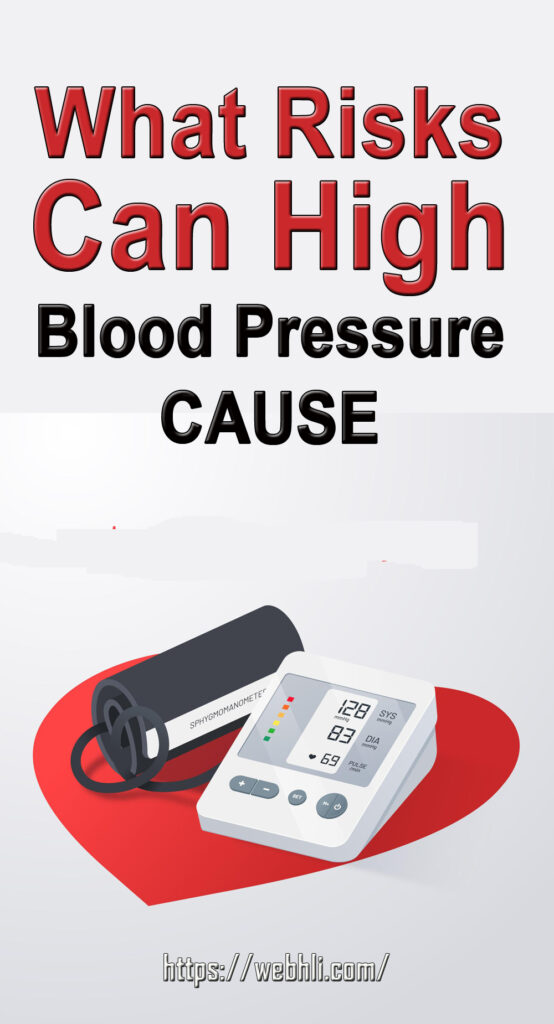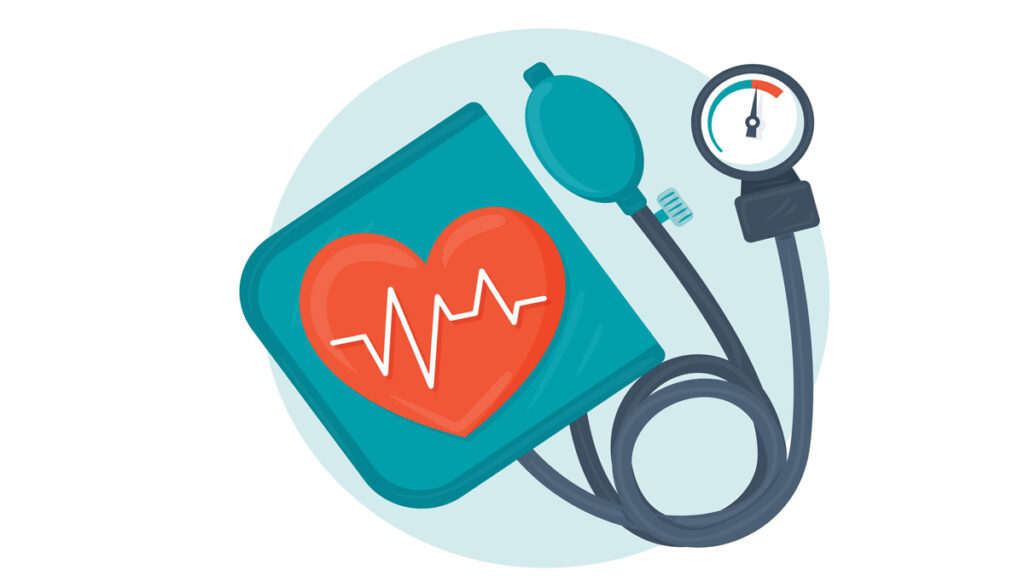To Have some idea of the scale of the problem that high blood pressure can cause, think about it this way. Every single blood vessel in your body, every area where blood is present is under increased pressure every second of every day, 24/7, 365 days a year.
Every capillary, artery and vein is at risk of bursting whether you are at rest or active whilst the major organs of your body could be flooded with excess blood or just give up at any time.
Consequently, the simple answer to the question of what damage high blood pressure can cause is, everything. There is no single millimeter of your body that is 100% safe if you suffer from a high blood pressure problem.
The following article will give you some idea of the problems that high blood pressure can cause and why you should get your blood pressure checked on a regular basis.
1- Heart attacks and cardiovascular disease
Heart attacks are the number one cause of death in the USA every year. Cardiovascular disease claims another victim every 35 seconds, with two half thousand US citizens dying of heart attacks every day.
High blood pressure is the number one cause of deaths from cardiovascular disease and heart attacks, with nearly 70% of people who suffer their first heart attack being a high blood pressure sufferer as well. The major problem is the fact that high blood pressure can cause many different heart problems, any of which can be fatal.
In the most obvious example of suffering a fatal heart attack, your heart simply gives up the increased effort of having to pump blood at a higher pressure than it should.
The fact that your heart has to work harder to pump blood around your body means that over time, it will become thicker and stiffer (your heart is nothing more than a muscle) which makes it far less capable of doing the job that it is supposed to do. This often leads to an increasing degree of heart failure, an inability for your heart to do the job for which it is designed. If not treated, this will often lead to a heart attack.
An alternative scenario is one where your heart becomes enlarged because of the increased blood pressure. An enlarged heart is not capable of pumping blood as efficiently as it should do, meaning that you are once again at an increased risk of suffering a heart attack, whilst there are also many other associated medical problems that could result from a weakened or enlarged heart.
2- Brain problems
If cardiovascular disease and heart attacks is the number one killer in the USA, strokes are the third most common cause of death. Uncontrolled blood pressure can result in damaged or narrow blood vessels in the brain, which in turn increases the risk of a blood vessel becoming blocked or bursting.
In this situation, restricting blood flow to a certain part of the brain can cause the cells of that particular area of your brain to cease functioning either temporarily or permanently. In effect, part of your brain dies and that carries a significant risk that you will die as well.
This is one of the reasons why if you suffer from persistent, severe headaches, you should visit your doctor as this may be a sign of impending blood vessel failure in your head. Similarly, dizziness, blurred vision, feeling inextricably weak or numb or losing the ability to talk clearly could all be signs that a stroke caused by high blood pressure could be imminent.
Another problem to which high blood pressure can contribute is a form of dementia known as vascular dementia. This occurs when a certain portion of the brain is damaged because of erratic or irregular blood flow caused by high blood pressure which causes the sufferer memory loss, confusion and sometimes a loss of speech.
Moreover, because dementia is a progressive condition, it is likely that anyone who is suffering from vascular dementia because of high blood pressure is likely to get gradually worse over time.
3- Kidney problems
The primary function of the kidneys is to filter your blood to remove unwanted waste products which are then discharged from the body. If however you have some kind of kidney problem or a kidney disease, the ability to function is somehow reduced, meaning that if you do not take remedial steps, kidney damage can become a serious problem.
High blood pressure can cause kidney problems, or in some cases, pre-existing kidney damage can cause high blood pressure. However, whichever way round this happens, the main problem is that kidney damage is less likely to lead to kidney failure and far more likely to lead to heart attacks and strokes.
This often happens because as your kidneys become less efficient, they are less able to filter and clean your blood, meaning that dirt and other possible blockages are left to flow around your body in the bloodstream.
Hence, if you have any kind of kidney problem, it is absolutely essential to keep your heart and blood vessels as healthy as possible which means that you must control your high blood pressure problem.
What is the best thing to drink for your kidneys
4- Eyes problems
Not only does high blood pressure have the potential to damage your heart, brain and kidneys, it can damage any area of your body where there are blood vessels. Hence, it is possible that high blood pressure can have an adverse effect on both your eyesight and your mobility.
If your doctor establishes that you have a high blood pressure problem, they will often investigate your eye because the small blood vessels, the capillaries at the back of your eye are the only blood vessels which are visible. Thus, they can investigate whether any of these capillaries have expanded, burst or suffered any other damage.
If they do so, it is highly likely that your eyesight will be adversely affected in some way. Hence, it may even be possible that a sight problem is a sign of high blood pressure and potentially something far more serious.
Does Stress Cause High Blood Pressure
And because high blood pressure makes your heart become thicker and less able to do its job properly, it is not uncommon for high blood pressure sufferers to experience swollen ankles and other swollen limb extremities. This happens because your heart is less efficient than it was before you suffered a high blood pressure problem so that it is less capable of pushing blood around your body. Hence, blood starts to accumulate in your ankles and lower legs and whilst in the short term this may be nothing more than an unsightly inconvenience, it can lead to more serious problems over the longer term such as varicose veins, cellulitis and venous ulcers.
Some high blood pressure sufferers will find that as they walk or move, they suffer painful cramping in the legs and ankle joints that goes away when they stop moving. This could be a result of peripheral arterial disease, a condition caused by a narrowing of the arteries which prevents sufficient blood being transported to the limbs, hence the pain. Peripheral arterial disease is another potentially serious condition that can be caused by high blood pressure.
5- Other problems
There are particular health concerns for men and women that are often associated with high blood pressure. For instance, men who suffer from high blood pressure will sometimes suffer from erectile dysfunction as well as a result of damage to the arteries that transport blood to the penis to enable and sustain an erection.
Some women will suffer increased blood pressure as a result of pregnancy, a condition which can sometimes continue for a number of weeks after the baby had been born. Generally speaking, high blood pressure of this nature is likely to be nothing more than temporary, although if it does persist for anything more than a few weeks after your baby is born, you need to seek medical advice.
On the other hand, if you already suffer from high blood pressure, it is perfectly possible and feasible to enjoy a completely normal pregnancy and birth, although once again, seeking medical advice as soon as possible after discovering your pregnancy is an absolute must.
Another thing to watch out for when it comes to high blood pressure is hormone replacement therapy, as HRT typically includes estrogen, a hormone known to raise blood pressure.
At the same time, an increase in blood pressure around the time of starting HRT or around the time does not necessarily mean that it is hormone replacement therapy that caused the pressure to rise.
As suggested above, increased blood pressure is a natural side effect of aging, so it could be an element of aging involved in the increase in pressure that occurs when HRT begins. .
Likewise, many oral contraceptive pills also contain estrogen, so the use of oral contraceptives of this particular type may also pose a risk of increased blood pressure.
A final important consideration is that if you have diabetes, high blood pressure can be a very serious problem. As a diabetic, your risk of heart problems, strokes, and kidney disease increases, while high blood pressure has the potential to exacerbate these problems even further. Therefore, if you are diabetic, high blood pressure is a condition for which you should seek treatment as soon as possible.




 Protected by Patchstack
Protected by Patchstack